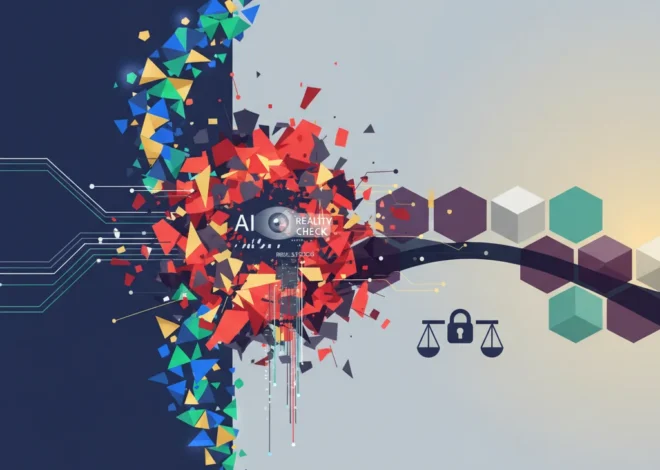
Beyond Grand Theft Auto: Why Rockstar’s Layoffs Signal a Tectonic Shift in Tech
The gaming world was recently rocked by news that felt both shocking and grimly familiar. Rockstar Games, the titan behind blockbuster franchises like Grand Theft Auto and Red Dead Redemption, has been accused of “union busting” after laying off dozens of employees at its UK studios. According to a report from the BBC, the Independent Workers’ Union of Great Britain (IWGB) stated that 31 people were fired, a move they claim is a direct retaliation against a growing push for unionization within the company.
While the numbers might seem small compared to the mass layoffs we’ve seen at Google or Meta, this incident is a microcosm of a much larger, more complex storm brewing at the intersection of corporate strategy, labor rights, and technological disruption. This isn’t just a story about one gaming studio. It’s a critical data point in the evolving narrative of work in the digital age, with profound implications for developers, tech professionals, and the future of innovation itself.
What happens when a culture of “crunch” collides with the drive for hyper-efficiency, all under the shadow of advancing artificial intelligence? Let’s unpack the layers of this story and explore what it means for the entire tech ecosystem.
The Tip of the Iceberg: A Wave of Tech Layoffs
Rockstar’s actions didn’t happen in a vacuum. The tech industry, once a bastion of perpetual growth and lavish perks, has been undergoing a painful correction. Since the beginning of 2023, the sector has seen a relentless wave of layoffs. According to data from Layoffs.fyi, over 400,000 tech workers have lost their jobs since the start of last year. Giants like Amazon, Microsoft, and Google have shed tens of thousands of employees, and the gaming sector has been hit particularly hard.
This widespread “right-sizing” is often framed by executives as a necessary response to post-pandemic market corrections and economic headwinds. However, a deeper look reveals a more strategic, long-term shift. Companies are aggressively pivoting towards efficiency, profitability, and leaner operational models. The era of “growth at all costs” is over, replaced by a mandate to do more with less. And this is where technology, particularly automation and AI, enters the chat.
Here’s a snapshot of some of the major layoffs that have defined the gaming and tech landscape recently:
| Company | Approximate Number of Layoffs (2023-2024) | Context / Stated Reason |
|---|---|---|
| Microsoft (incl. Activision Blizzard) | ~1,900 (in gaming divisions) | Post-acquisition restructuring and synergy. |
| Sony (PlayStation) | ~900 | Global restructuring to adapt to industry evolution. |
| Unity | ~1,800 | Company “reset” and focus on core business. |
| Electronic Arts (EA) | ~670 | Moving away from licensed IP and focusing on owned IP. |
This table illustrates that the trend is industry-wide. The pressure from investors to streamline operations is immense, forcing even the most successful companies to make deep cuts. These decisions create a climate of fear and uncertainty for employees, which naturally leads to a search for collective power and protection.
Beyond the 'Glasshole': Can AI Finally Make Smart Glasses a Reality We Trust?
The Automation Anxiety: Is AI Coming for Developers’ Jobs?
While no CEO will explicitly state, “We’re firing people to replace them with AI,” the subtext is becoming increasingly hard to ignore. The rapid advancements in artificial intelligence and machine learning are fundamentally changing the nature of software development and creative work.
In game development, AI is no longer just for creating smarter non-player characters (NPCs). It’s being leveraged across the entire production pipeline:
- Code Generation: Tools like GitHub Copilot can now write entire functions and boilerplate code, accelerating the programming process.
- Asset Creation: Generative AI can produce concept art, textures, and even 3D models, potentially reducing the need for large art teams.
- Quality Assurance (QA): Automation powered by machine learning can run thousands of tests, identify bugs, and analyze game balance far faster than human testers.
- Cloud & SaaS Integration: The shift to cloud-based development environments and SaaS (Software as a Service) tools enables more distributed and automated workflows, further optimizing resource allocation.
For startups and established companies alike, the allure of this technology is undeniable. It promises faster development cycles, lower costs, and the ability to scale creative ambitions without linearly scaling headcount. However, for the developer on the ground, this technological leap feels less like an opportunity and more like an existential threat. The fear is that skills that were once highly specialized and valuable could be devalued or automated away, leaving even senior engineers vulnerable.
A Collective Response: The Rise of Tech Unionization
Faced with mass layoffs and the looming specter of AI-driven job displacement, it’s no surprise that workers are seeking a stronger voice. The “union busting” accusation at Rockstar is a flashpoint in a much broader movement. For decades, the tech industry, with its individualistic, meritocratic ethos, was seen as immune to unionization. That is rapidly changing.
We’ve seen successful union drives at companies like Google Fiber contractors, Apple retail stores, and numerous game studios. The motivations are clear: workers want better job security, a say in decisions that affect their livelihoods (like return-to-office mandates), and protection against arbitrary firings. The push for unionization is a direct, human response to the perception that employees are being treated as disposable cogs in a machine increasingly optimized for pure financial efficiency.
When a company like Rockstar allegedly fires employees shortly after they begin organizing, it sends a chilling message. Whether legally defined as “union busting” or not, the impact is the same: it creates a culture of fear designed to quell collective action. This is a classic, old-school labor struggle playing out in the most modern of industries.
The Silver Tsunami Meets the AI Revolution: Uncovering the Biggest Tech Opportunity of Our Time
The Hidden Risks: Cybersecurity and the Cost of Lost Knowledge
There’s another critical angle to these mass layoffs that executives and startups often overlook: the long-term strategic costs, particularly in the realm of cybersecurity and institutional knowledge.
Every time an experienced developer or IT professional is laid off, a vast repository of tacit knowledge walks out the door with them. They know the quirks of legacy code, the undocumented dependencies in the cloud architecture, and the subtle vulnerabilities that automated scanners might miss. This brain drain creates significant risks:
- Increased Security Vulnerabilities: Fewer experienced eyes on the codebase means a higher likelihood of security flaws slipping through into production. The remaining team, stretched thin, may cut corners on security protocols to meet deadlines.
- Insider Threats: While most employees are professional, mass layoffs can create disgruntled ex-employees. A poorly managed offboarding process can leave security backdoors open, creating a potential for data theft or sabotage. Robust cybersecurity measures are non-negotiable during these transitions.
- Stifled Innovation: Innovation doesn’t just come from new tools; it comes from experienced people who have the psychological safety to experiment and fail. A culture of fear, where anyone could be next on the chopping block, is the antithesis of an innovative environment. Teams become risk-averse, and true progress grinds to a halt.
For entrepreneurs and leaders of startups, this is a cautionary tale. While staying lean is essential, cutting deep into your engineering and security teams can be a fatal, short-sighted mistake. The cost of a single major data breach can far outweigh the salary savings from a round of layoffs.
The AI Productivity Paradox: Are You Busier, or Actually Better?
The Path Forward: A New Contract for Tech Workers
The situation at Rockstar Games is more than just a headline; it’s a harbinger of the future of work in the tech industry. The collision of economic pressure, transformative AI, and a newly empowered workforce is forcing a reckoning that is long overdue.
The solution isn’t to halt technological progress or demonize efficiency. The path forward requires a more human-centric approach to innovation. Companies must see their employees not as costs to be minimized, but as partners in navigating this complex transition. This means transparent communication about the role of AI, investment in reskilling programs, and a genuine willingness to listen to worker concerns—whether through a union or other channels.
For developers, programmers, and tech professionals, the message is clear: continuous learning and adaptability are more crucial than ever. But so is collective solidarity. The lone-wolf coder archetype is becoming obsolete. The future belongs to those who can not only write brilliant code but also organize, advocate, and build resilient communities.
The drama unfolding at the home of Grand Theft Auto is a reminder that even the biggest players in the industry are not immune to these foundational shifts. How they, and the rest of the tech world, respond will define the landscape of software and innovation for decades to come.


